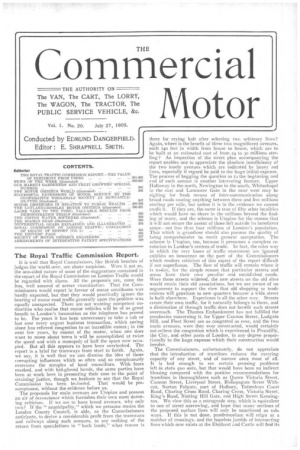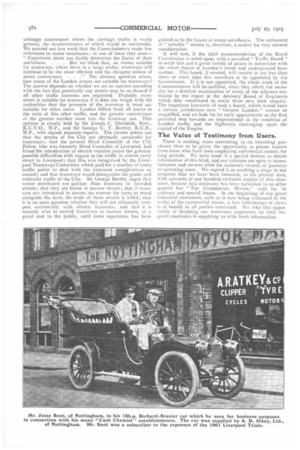The Royal Traffic Commission Report.
Page 1

Page 2

If you've noticed an error in this article please click here to report it so we can fix it.
It is well that Royal Commissions, like British benches of judges the world over, are above suspicion. Were it not so, the one-sided nature of some of the suggestions contained in the report of the Royal Commission on London Traffic would be regarded with alarm. All the proposals are, none the less, well assured of severe examination. That the Commissioners would report in favour of motor omnibuses was hardly expected, but that they would practically ignore the bearing of motor road traffic generally upon the problem was equally unexpected. There are not wanting competent authorities who realise that motor vehicles will be of as great benefit to London's locomotion as the telephone has proved to be. For years it has been unnecessary to take a cab or bus over every urgent business transaction, which saving alone has relieved congestion to an incredible extent; in the next few years, by reason of the motor, when one does want to move about town it will be accomplished at twice the speed and with a monopoly of half the space now occupied. But all this appears to have been overlooked. The report is a brief for tramways from start to finish. Again, we say, it is well that we can dismiss the idea of those corrupting influences which so often and so conspicuously overcome the scruples of local councillors. With faces masked, and with kid-gloved hands, the same parties have been at work here in presenting their case to the point of straining justice, though we hesitate to say that the Royal Commission has been be-fooled. That would be presumptuous, without the evidence before us.
The proposals for main avenues are Utopian and possess an air of insouciance which furnishes their own most damning criticism. If we are to have broad avenues, why only two? If the "municipality," which we presume means the London County Council, is able, as the Commissioners anticipate, to derive a considerable profit from the tramways and railways along such avenues, to say nothing of the return from speculations in "back lands," what reason is there for crying halt after selecting two arbitrary lines? Again, where is the benefit of these two magnificent avenues, each 140 feet in width from house to house, which are to be built at an estimated cost of from 24 to 30 millions sterling? An inspection of the street plan accompanying the report enables one to appreciate the absolute insufficiency of the two lonely avenues which are indicated by heavy red lines, especially if regard be paid to the huge initial expense. The process of begging the question as t the beginning and end of each avenue is another interesting feature. Upper Holloway in the north, Newington in the south, Whitechapel in the east and Lancaster Gate in the near west may be sighing for fresh means of inter-communication along broad roads costing anything between three and five millions sterling per mile, but unless it is in the evidence we cannot credit it. If they are, the same is true of fifty other localities which would have no share in the millions beyond the finding of many, and the scheme is Utopian for the reason that it will not secure the assent of those left outside its beneficent scope—not less than four millions of London's population. That which is grandiose should also possess the quality of being comprehensive to merit general acceptation. The scheme is Utopian, too, because it presumes a complete revolution in London's centres of trade. In fact, the calm way in which the very bases of traffic movement are ignored exhibits an innocence on the part of the Commissioners which renders criticism of this aspect of the report difficult if not superfluous. The flow of traffic will remain where it is to-day, for the simple reason that particular streets and areas have their own peculiar and established needs. Were these streets widened, the new streets on the old sites would retain their old associations, but we are aware of no arguments to support the view that old shopping or trade centres will gravitate to new quarters because a wide street is built elsewhere. Experience is all the other way. Streets create their own traffic, for it naturally belongs to them, and a diminution of through traffic does not benefit such streets overmuch. The Thames Embankment has not fulfilled the prophecies concerning it, for Upper Cannon Street, Ludgate Hill, and Fleet Street are as congested as ever, and the two main avenues, were they ever constructed, would certainly not relieve the congestion which is experienced in Piccadilly, the City, and other parts of London, in any degree proportionally to the huge expense which their construction would involve.
The Commissioners, unfortunately, do not appreciate that the introduction of tramlines reduces the carrying capacity of any street, and of narrow ones most of all. It is bad enough to see certain pressing problems left in statu quo ante, but that would have been an indirect blessing compared with the positive recommendations for tramlines in thoroughfares such as Queen Victoria Street, Cannon Street, Liverpool Street, Bishopsgate Street Without, Norton Folgate, part of Holborn, Tottenham Court Road, Charing Cross Road, Charing Cross, Victoria Street, King's Road, Notting Hill Gate, and High Street Kensington. We view this as a retrograde step, which is equivalent to one of street narrowing, and hope that many sections of the proposed surface lines will only be sanctioned as subways. If this is not done, pandemonium will reign at a number of crossings, and the hopeless jumble of intersecting lines which now exists at the Elephant and Castle will find its unhappy counterpart where the carriage traffic is vastly greater, the inconveniences of which would be intolerable. We pointed out last week that the Commissioners made few references to motor omnibuses : in one of these they state" Experience alone can finally determine the limits of their usefulness. . . . But we think that, on routes suitable far tramways, where there is a large traffic, tramways will continue to be the most efficient and the cheapest means of street conveyance. . . ." The obvious question arises, how many of the London streets are suitable for tramways? The answer depends on whether we are to concern ourselves with the fact that practically any streets may be so classed if all other traffic interests are neglected Probably every street is suitable for tramways if it does not weigh with the authorities that the presence of the tramway is most unsuitable for other users. London differs from all towns in the ratio of this other traffic, and the greater convenience of the greater number must rule the tramway out. This opinion is clearly held by Sir Joseph C. Dinisdale, Bart., K.C.V.O., M.P.' and Sir George C. '1'. Bartley, K.C.B., M.P., who signed separate reports. The former points out that the streets of the City are obviously unsuitable for tramways ; that the present Head Constable of the City Police, who was formerly Head Constable of Liverpool, had found the introduction of electric traction create the greatest possible difficulties with regard to the traffic in almost every street in Liverpool; that this was recognised by the Liverpool Tramways Committee which paid-for a number of extra traffic police to deal with the increased compalications so caused; and that trainways would disorganise the goods and vehicular traffic of the City. Sir George Bartley urges that motor omnibuses are quicker than tramcars in crowded streets; that they are better in narrow streets ; that if tramcars are introduced in streets too narrow for carts to stand alongside the kerb, the trade of those streets is killed; that it is an open question whether they will not ultimately compete successfully with electric tramcars; and that it is scarcely wise to extend tramways in narrow streets, at a great cost to the public, until more experience has been
gained as to the future of motor omnibuses. The settlement of " suitable" streets is, therefore, a matter for very earnest consideration.
It will rest, if the chief recommendation of the Royal Commission is acted upon, with a so-called " Traffic Board" to settle this and a great variety of points in connection with the whole future of London's street and underground locomotion. This board, if created, will consist of not less than three or more than five members to be appointed by the Government. If it is not appointed, the whole work of the Commissioners will be nullified, since they admit the necessity for a detailed examination of many of the schemes embraced by the report of the Advisory Board of Engineers which they constituted to assist them over their enquiry. The important functions of such a board, which would have a certain jurisdiction over " Greater London," cannot be magnified, and we look for its early appointment as the first practical step towards an improvement in the condition of London traffic and the highways converging upon the capital of the Empire.
The Value of Testimony from Users.
There is nothing more convincing to an intending purchaser than to be given the opportunity to peruse reports from those who have been employing commercial motors for long periods. We have made it a special feature to obtain information of this kind, and our columns are open to manufacturers and owners alike for authentic records of journeys or operating costs. We regard it as marking a stage in our progress that we have been favoured, to the present date, with upwards of one hundred exclusive reports of this character, because this testimony has been furnished to no other quarter but "THE COMMERCIAL MOTOR," both for its ordinary and special issues. At the beginning of any great industrial movement, such as is now being witnessed in the realm of the commercial motor, a free interchange of views is of benefit to all parties concerned. We take this opportunity of thanking our numerous supporters for their frequent courtesies in supplying us with fresh information.


















